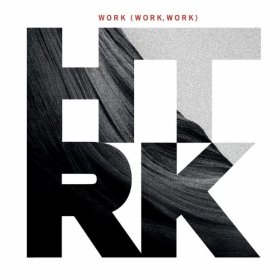Trading in a sound that’s best classified as doomed slowcore, you might say HTRK are in no rush to outrun their fear. They’re a dark prospect, all told. Not by virtue of the industrial space-junk that clouds the picture, or the narco-gothic setting, but due to the funereal pace at which events unfold. Fear is endemic in underground music right now, but no-one is prepared to linger there for quite as long as HTRK, who on Work (Work Work) have jettisoned their debut’s pop skeleton to ride a flat, locked trajectory to nowhere. This is not a criticism, however.
Some have complained that Work (Work Work) contains no songs. But here’s the theory. Intentionally, the tracks are devoid of structural narrative. Take narrative out of the equation and with it goes purpose. And without a purpose – or put another way, a destination – comes a type of music without resolution. If you combine this internal logic with HTRK’s funereal pacing, it evokes a unique scene – one of aimlessness in eternity. Or conceivably – because Work (Work Work) is no picnic – eternal damnation. And time goes slowly in hell. The Aussie emigres’ pace has its roots not in witch house or trap-rap as others have claimed, but right here in Blighty: with trip-hop and Massive Attack. Aided by Tricky, the Bristolians modernised music’s conception of the urban hellscape. An abstract realm situated roughly where the inner city is at its most subterranean, the trip-hop trio conceived of an aftermath / afterlife zone wherein the thin membrane separating the geezers from the spirit world has been eroded by evil doings. With ectoplasmic miasma collecting around sodium streetlights, occasionally the two worlds overlap, enabling dark spirits to live amongst the wiseguys in hollowpoint hell, as ‘angels with dirty faces’. It’s here where Tricky unites with his deceased mother Maxinquaye; when the dress-wearing genius wrote "Hell is round the corner”, he was speaking both geographically and literally.
Along with dark forces, from out of this open sour – a kind of inter-plein portal – leaks the inertia of eternity. And inertia – more or less HTRK’s default setting – doesn’t just hit you head on. Rather, as Massive Attack themselves once attested, inertia creeps. It’s in this same spirit that their descendents HTRK set about turning the screws ever so very slowly, and the reason why they don’t do bloody choruses.
Which brings us neatly to theory two. Historically speaking, structure, economy, dynamism, and various other songwriting conventions, rarely play a part in philosophical expressions of… (big voice) ANCIENT WOE. Take for example Sunn 0)), Barn Owl, Suicide, Tim Hecker, ‘Venus In Furs’, ‘Warsawa’; each of them amorphous, dirge-like and, in most cases, damned. Likewise, the songs on Work (Work Work) are content to hover in patient repetition, hypnotizing with plutonium eyes, and accumulating resonance, not by build or gear-changing or evolution, but by simply holding formation until the unflinching stare has you climbing the walls. Case in point – ‘Bending’. Composed merely of unrelenting abyssal detonations and disorientated vocals, it nevertheless reeks of pressure, estrangement and decompression sickness in a daunting British reality, without ever really getting off its knees. Criticising HTRK for lacking in songs is like penalising Slint for procrastination.
At any rate, with or without the organizing effect afforded by sharp song structure, vocalist Jonnine Standish and guitarist Nigel Yang have created something enduring here. Think Low’s ‘Shame’ reassembled by Nelly Hooper, intent on taking dub-inspired rock in a novel, elegant and distinct direction, and you’re almost there. In the same manner as Portishead’s Third, Work (Work Work) rubs lushness against brittle, stark severity, while anchoring its electro-hydraulic anatomy to an undertone of subtle soulfulness: nuance which only reveals itself with repeated listening, on what at first appears to be an relatively blank canvas. ‘Slo Glo’ is bracingly frigid – teeth-aching synth effects piercing remote swathes of guitar – while ‘Synthetik’ recalls both chiller-wave act Gatekeeper and Paranormale Aktivitat, Zwischenwelt’s Cold War-set thriller. Meanwhile ‘Body Double’ talks fucking ("It’s just business baby”) while ‘Poison’ pulses under reptilian atmospherics. However, it’s Work (Work Work)‘s most uneventful track which lingers longest in the memory. Beginning with a weary sense of purpose, ‘Work That Body’ gradually evaporates into a cloud of handclaps and dead space. Musically speaking, tranquility is rarely this disquieting.
On the whole, though, these songs are at their best when grounded in low region trickery: rumbles, clipping sounds, droplets, shudders, judders and all manner of absorbed low freak-uency eeriness, as exhilaratingly creepy as anything offered up by trip-hop’s most skilled practitioners. Tracks like ‘Eat You Heart’ boast mutant bass effects that knock at your windpipe, linger somewhere around the threshold of auditory perception, and serve to hone Standish’s relatively benign vocals into a kind of lethal sexuality. It’s refreshing to encounter innovative, vivid bass science hatched outside the post-dubstep mindset, made even more effective when paired with ominous guitar. The heaviosity also compensates for the several occasions the duo lapse into less impressive fare, as on ‘Love Triangle’, which sounds a bit like Zero 7 on a comedown. Otherwise, Work (Work Work) is a must-have for diehard technophiles and a fitting tribute to bassist Sean Stewart, who passed away before its completion.


